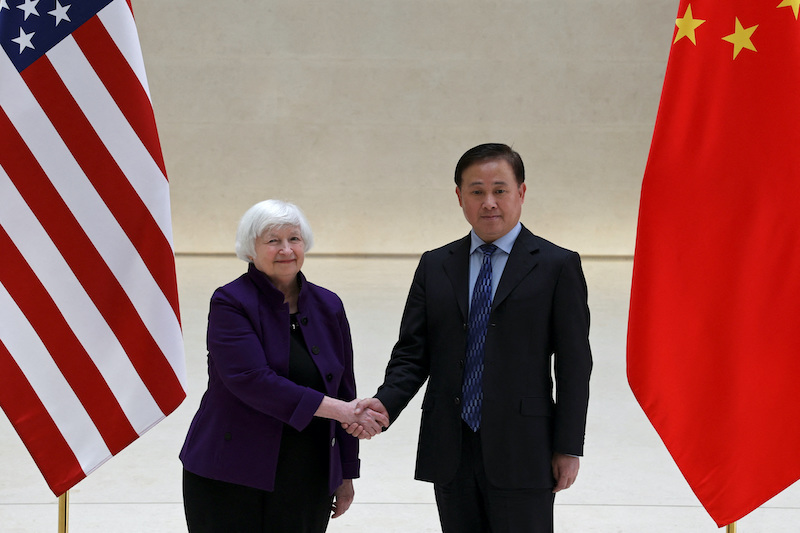US Treasury Secretary Janet Yellen warned financial leaders in Beijing on Monday that the United States won’t accept new industries being destroyed by imports subsidised by the Chinese government.
Yellen, who was wrapping up four days of talks in Guangzhou and the Chinese capital, said the US steel sector had been crushed by cheap Chinese steel a decade ago and they did not want to endure that experience again.
She told a news conference she had raised concerns about China’s weak domestic demand and over-investment in industries such as electric vehicles, batteries and solar products, fuelled by “large-scale government support.”
ALSO SEE: Dutch May Give in to US Push Against Servicing China Chip Tools
“We’ve seen this story before,” Yellen said. “Over a decade ago, massive PRC government support led to below-cost Chinese steel that flooded the global market and decimated industries across the world and in the United States, employing the formal name, the People’s Republic of China.”
“I’ve made it clear that President Biden and I will not accept that reality again.”
Yellen said that when the global market is flooded with artificially cheap Chinese products, “the viability of American and other foreign firms is put into question”.
Yellen, on her second trip to China in nine months to further ease strained ties between the world’s two largest economies, met central bank chief Pan Gongsheng on Monday when pressing her case for Chinese leaders to rein in excess industrial capacity and boost domestic demand.
She has argued that Chinese state support has led to production capacity that far exceeds domestic demand, and the exports will threaten jobs in the US and other countries.
Yellen spoke about the issue at length with Chinese Premier Li Qiang and met with Finance Minister Lan Foan on Sunday.
On Monday, she met with former vice premier Liu He, plus People’s Bank of China governor Pan Gongsheng.
China banks could face sanctions for Russia arms deals
At the US ambassador’s residence, Yellen also warned that Chinese banks that “facilitate significant transactions that channel military or dual-use goods to Russia’s defence industrial base” could face “significant consequences” – US sanctions.
That warning followed a report on Sunday by the Telegraph in London that China has boosted support for the Russian war in Ukraine “by sending rifle scopes, tank components, rocket fuel and satellite images” to Moscow.
It came just before a visit to Beijing by Russian foreign minister Sergei Lavrov to discuss the war, the report said, adding that China was allegedly “sending microelectronics, propellants used in missile production and turbojet engines to Russia, sidestepping Western sanctions.”
Meanwhile, in a readout of the finance meeting, the Treasury said Yellen and Lan discussed the macroeconomic outlook and financial developments in the US and China.
“They also discussed the important role that Treasury and the Ministry of Finance can play in maintaining a durable communication channel between the US and China,” the Treasury said.
Chinese officials, media push back
Li pushed back on Yellen’s criticism of gross oversupply of EVs, solar and other products, according to Xinhua, which quoted him as saying the US should “refrain from turning economic and trade issues into political or security issues” and view the issue of production capacity from a “market-oriented and global perspective”.
Chinese Commerce Minister Wang Wentao voiced more pointed objections during a roundtable meeting with Chinese EV makers in Paris, saying that US and European assertions of Chinese excess EV capacity were groundless.
“China’s electric vehicle companies rely on continuous technological innovation, perfect production and supply chain system and full market competition for rapid development, not relying on subsidies to gain competitive advantage,” Wang said during his trip to discuss a European Union anti-subsidy probe.
State media outlet, the Global Times, also hit out at the US move to curb exports of advanced chips, saying it was an “unreasonable crackdown” that would disrupt the chip sector’s global supply lines and backfire on the US and its allies.
It quoted local exports who said “the moves would only burden global consumers and companies with high costs and interrupt firms’ normal operations.”
US Commerce Secretary Gina Raimondo told a news conference in Belgium, at a Trade and Technology Council meeting on Friday, that China was producing about 60% of legacy chips, found in cars, household appliances and medical devices, and that would continue in the coming years.
“We know there’s a massive subsidization of that industry on behalf of the Chinese government, which could lead to huge market distortion. That’s why we’re focused on it,” she said.
But Gao Lingyun, an expert at the Chinese Academy of Social Sciences, responded by saying the term “market distortion” was questionable, as consumers and enterprises would benefit from China’s ramped-up production capacity because it would lead to lower prices.
“This is not ‘market distortion’ but a more efficient means of production,” he was quoted as saying.
- Reuters with additional input and editing by Jim Pollard
NOTE: A new link to Raimondo’s remarks at the Trade and Technology Council press conference was added on April, 8, 2024.
ALSO SEE:
Dutch May Give in to US Push Against Servicing China Chip Tools
China Central Bank Announces $70 Billion Loans For Tech Sector
Yellen Warns China on ‘Excess Production, Unfair Trade’
Yellen Warning to China on Oversupply Seen Falling on Deaf Ears
US-China Need ‘Tough’ Conversations, Yellen Tells Li Qiang
China’s Solar Sector Seen Facing Years of Oversupply, Low Prices
























